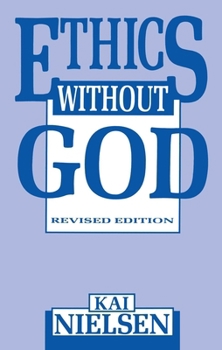Ethics Without God
Select Format
Select Condition 
Book Overview
Nielsen argues that morality cannot be based on religion, and that there is no evidence to show that nonbelievers despair or lose their sense of identity and purpose. He shows that the implications of Christian absolutism are more likely to be monstrous than are those of a secular ethic that incorporates an independent principle of justice.
Format:Paperback
Language:English
ISBN:0879755520
ISBN13:9780879755522
Release Date:October 1990
Publisher:Prometheus Books
Length:210 Pages
Weight:0.92 lbs.
Dimensions:0.6" x 6.0" x 9.0"
Customer Reviews
4 ratings
Clarity is this philosopher's hallmark
Published by Thriftbooks.com User , 17 years ago
Nielsen has always struck me as one of those philosophers whose thought is pellucid, whose writing style is admirably readable, whose breadth of knowledge is encyclopediac, and whose philosophical positions, while ably defended, are almost always wrong (he is, for example, one of the few philosophers I know who still wants to take the verificationist principle seriously). Whenever I read him, he provides me with an example of clarity to emulate and a philosophical challenge to meet. I'm grateful to him for both. In this revised edition of a book that I first read in graduate school, Nielsen most substantial additions are a long opening chapter on natural law theory and sociological analyses of religion and a closing chapter in which he highlights his own secular ethics. Like many of his books, this one is largely composed of previously published articles. There tends, therefore, to be a certain amount of repetition, and some chapters (7 & 8, for example) seem to break the flow. But overall, the book is a good introduction to Nielsen's brand of atheistic ethics. Nielsen rejects divine command theory as well as natural law tradition, and argues instead for a humanistic ethic that ultimately seems to be based on an analysis of natural needs. Certain conditions are necessary for leading a happy life: e.g., security, companionship, creative employment, and so on. These needs, because they're necessary conditions for happiness, are values, and they can serve as the basis of a secular ethics. It's never entirely clear to me from Nielsen's analysis why I should honor the furtherance of these needs in others, especially if their furtherance might step on my own toes. But he concludes that justice, or fairness, requires that I value for the other what I value for myself. One suspicious move that Nielsen makes several times (especially in the final two chapters) is to conflate meaning with morality. This move is made, presumably, because there's some connection in Nielsen's mind between meaning, happiness, and value. But for the life of me, I can't figure out what the entailment is. Surely we can be happy in a meaningless context, and unhappy in a meaningful one. Similarly, my adherence to moral standards doesn't seem to be contingent on meaning. Otherwise, I would necessarily lose my bearings in chaotic situations. Nielsen always makes one think, and this little book is one of his most interesting. Highly recommended.
Objective Values
Published by Thriftbooks.com User , 18 years ago
Since when was the objectivity of morals and values a fact? Last I heard, there was much debate concerning the subjectivity or objectivity of ethics, values, and morals. Claiming that there are objective morals, that it is a fact, and then slamming the book for this self-created truth is irrational.
Tough Questions
Published by Thriftbooks.com User , 24 years ago
Difficult for a non-philosopher (i.e., "me"), but not too difficult to read with pleasure. Can a Christian also be a good person? The question is no mere provocation; there are serious philosophical problems in reconciling fidelity to God and ethical behavior. This book doesn't take on hate-mongers hiding behind Bibles, but rather the pure question of good and evil in people of honest motives. His most memorable argument seems to go like this: Ought we to obey the will of God? Of course we should, the believer answers. But why? Because He is almighty and powerful and will punish us if we do not obey? Well, then, obeying God is no better than obeying Stalin and Hitler. Or because he is always good? In that case, you invoke something within you, some discernment of "good," that you apply even to an order from the deity. So why not dispense with the cumbersome deity altogether, and focus on the internal discernment?
A courageous, articulate defense of ethics
Published by Thriftbooks.com User , 26 years ago
Nielsen provides a provacitve argument for the much disparaged claim that ethical behavior can, and indeed, must be produced outside of the repressive guilt factories of Judeo-Christian-Islamic religions. Nielsen persuasively posits a code of ethical behavior that is based solely on the principle of the betterment of human life and makes a vital distinction between morals and ethics--a distinction lost upon both many religious leaders and aetheists today. This book, upon careful reading, will challenge both aetheists as well as religious people.





